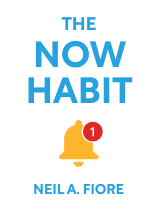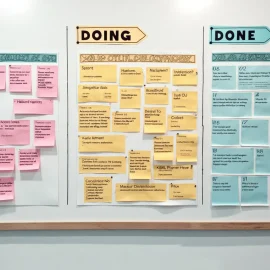

This article is an excerpt from the Shortform book guide to "The Now Habit" by Neil A. Fiore. Shortform has the world's best summaries and analyses of books you should be reading.
Like this article? Sign up for a free trial here.
What are some common signs of procrastination? What does procrastination look like for you?
Many people struggle with procrastination, but it manifests differently for everyone. Paradoxically, procrastination may even look like productivity: You may be busy doing tasks, yet putting off the one task that’s most important.
Here are common signs of procrastination so that you can recognize it in your own life.
The Pattern of Procrastination
According to Neil Fiore, the author of The Now Habit, there are four major signs of procrastination:
1) You make a task seem more momentous than it really is by thinking that your identity, happiness, worthiness, and so on depend on your success. For example, if you have a job interview, you might tell yourself that you need this job to keep your life on track and that if you don’t get it, you’ll be a failure. Suddenly your entire future—and your value as a person—seems to rest on a brief conversation with a stranger.
(Shortform note: In many cases, society encourages us to think this way. For instance, in Black Box Thinking, Matthew Syed points out that many of our social and cultural institutions are based on the assumption that experts never make mistakes, which in turn means that mistakes prove there’s something wrong with you. This kind of pressure can lead to procrastination, as Fiore argues—but Syed points out that it can also lead to behaviors like scapegoating, covering up your mistakes, and so on.)
2) You determine that only perfect success is good enough and that anything less would be catastrophic. This makes the task seem impossibly difficult and frightening. For example, you might tell yourself that you have to completely blow away your interviewer. All your answers need to be eloquent and insightful. You can’t misspeak or look the slightest bit unprepared. Obviously, this is a completely unreasonable standard to expect of yourself.
(Shortform note: In fact, this kind of thinking is based on what mental health experts call cognitive distortions—incorrect and unhelpful ways of interpreting the world that lead to psychological distress. In Cognitive Behavior Therapy: Basics and Beyond, Judith S. Beck lists a number of distortions—such as catastrophizing, all-or-nothing thinking, and exaggeration—that might contribute to procrastination by causing anxiety about work.)
3) Because of the pressure you’ve piled onto the task, you freeze up—instead of starting on the task, you just keep thinking of all the things that could go wrong. For example, instead of planning for the interview, you just keep telling yourself how difficult and stressful the interview will be and how likely you are to screw it up. In other words, when the self-imposed stress becomes too much, you procrastinate by avoiding the task altogether.
(Shortform note: One of the difficulties in treating procrastination is that distorted thoughts tend to reinforce each other. For example, first you create stress and anxiety by telling yourself that your whole life hinges on giving a perfect interview. Then, because of emotional reasoning, you believe that the interview itself (rather than your thoughts) caused your stress—which in turn seems to prove that you have no chance of succeeding. On top of that, if you then criticize yourself for procrastinating, the added stress of self-judgment similarly seems to prove that you’re lazy, inadequate, and so on.)
4) Finally, you wait until some external pressure—like an impending deadline or consequence—forces you to do the task. Because you’re rushed, you’re likely to do the task in a haphazard way, which means you won’t do it as well as you were capable of. For example, your job interview is on the calendar—no matter how much you procrastinate, you’ll have to show up whether you’re prepared or not. (Shortform note: This reliance on external pressure explains why self-imposed deadlines generally don’t work to prevent procrastination. If we know that there’s no real consequence attached to a deadline, we don’t feel the necessary push to get started.)
Fiore argues that part of the reason procrastination becomes ingrained is that it has several dubious benefits:
1) It gives us some short-term relief from the stress we feel about the task. This relief is only temporary, as it leads to more stress and guilt down the line—but that’s not always obvious in the moment. (Shortform note: As Rhiannon Beaubien and Rosie Leizrowice explain in The Great Mental Models Volume 3, we sometimes form harmful habits because of the gap between short-term and long-term feedback from our behaviors. In other words, a behavior like procrastination creates positive feedback in the short term while its negative feedback happens late enough that it’s hard to make the connection between behavior and consequence.)
2) It relieves the burden of perfectionism because when we procrastinate, we know we’re not doing our best. This means that any flaws in our results seem to reflect on us less than if we’d tried our hardest. We tell ourselves that any mistakes or imperfections resulted from our lack of time and effort, not our lack of ability. (Shortform note: In other words, procrastination is a form of self-sabotage—a phenomenon that can also manifest as more obviously damaging behaviors such as substance abuse and self-harm.)
3) On some level, procrastination works. Most of the time, the task does get done in the end. Whether that’s because an external pressure forces us to do it, because somebody else completes the task for us, or because we wait so long that the task becomes irrelevant, we learn that procrastination is a flawed but viable strategy. (Shortform note: This might be why so many of us claim to work best under pressure. We’ve so internalized the process that Fiore describes that we don’t know a better way to motivate ourselves than by waiting until a task is an emergency.)

———End of Preview———
Like what you just read? Read the rest of the world's best book summary and analysis of Neil A. Fiore's "The Now Habit" at Shortform.
Here's what you'll find in our full The Now Habit summary:
- Why people tend to put off the things that matter the most
- Where procrastination stems from, and why it doesn't mean you're lazy
- How to get more done while still maintaining a balanced life






